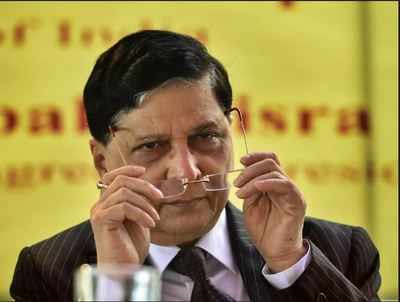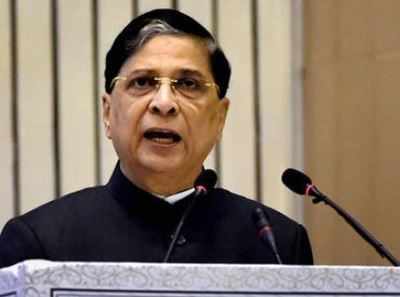- News
- India News
- CJI Dipak Misra-led benches to deliver 8 key verdicts in 6 working days
Trending
This story is from September 24, 2018
CJI Dipak Misra-led benches to deliver 8 key verdicts in 6 working days
From Aadhaar to Ayodhya, composition of different benches delivering judgments in these eight issues will involve 10 SC judges — CJI Misra and Justices Kurian Joseph, A K Sikri, R F Nariman, A M Khanwilkar, D Y Chandrachud, Ashok Bhushan, Sanjay Kishan Kaul, S Abdul Nazeer and Indu Malhotra.
Key Highlights
- In the last two decades, no CJI has headed as many constitution benches as CJI Dipak Misra.
- A CJI-led five-judge constitution bench has already delivered a landmark verdict decriminalising Section 377 of IPC to legalise gay sex.
- From Aadhaar to Ayodhya, composition of different benches delivering judgments in these eight issues will involve 10 SC judges.
NEW DELHI: CJI Justice Dipak Misra will retire on October 2, a little over a week from now. In the last two decades, no CJI has headed as many constitution benches as CJI Misra and worked ceaselessly to decide intricate constitutional questions touching the political, personal, religious and economic life of the nation, its cultural mosaic and social beliefs.
A CJI-led five-judge constitution bench has already delivered a landmark verdict decriminalising Section 377 of IPC to legalise gay sex. The next nine days, of which only six are working, will see different benches led by the CJI pronounce judgments on eight important issues.
From Aadhaar to Ayodhya, composition of different benches delivering judgments in these eight issues will involve 10 SC judges — CJI Misra and Justices Kurian Joseph, A K Sikri, R F Nariman, A M Khanwilkar, D Y Chandrachud, Ashok Bhushan, Sanjay Kishan Kaul, S Abdul Nazeer and Indu Malhotra.
The verdict on validity of Aadhaar , challenged by a bunch of petitioners led by a retired HC judge K Puttaswamy on the ground that it violated right to privacy of individuals , was reserved four and half months ago by a fivejudge bench after a marathon 40-day hearing.
If the Aadhaar verdict could potentially affect, or boost, the economic and social welfare of millions living below the poverty line as also make or mar the Modi government’s ‘one nation one identity card’ slogan, the verdict on Ayodhya will determine how many more years it will take for the SC to decide the over century-old litigation, which has been pending in the apex court for the last eight years.
The Ayodhya case is an appeal against the Allahabad HC verdict dividing the disputed 2.77 acres of Ram Janmabhoom-Babri Masjid land equally between Ram Lalla, Sunni Waqf Board and Nirmohi Akhara. A three-judge bench will decide whether the dispute over the land, on which the 16th century masjid stood prior to its demolition on December 6, 1992, is required to be referred to a five-judge bench.
The Muslim parties through senior advocate Rajeev Dhavan had put a spanner in the process of the three-judge bench deciding the case by arguing that an off-the-cuff remark of the SC’s five-judge bench verdict in Ismail Faruqui case in 1994 that mosque was not essential for offering namaz had vitally influenced the Allahabad HC verdict. Dhavan had sought reference of this issue to a five-judge bench prior to the court proceeding to adjudicate the land dispute.
Staying with the religious issue, a five-judge bench will decide the validity of the tradition which bars women in the menstruating age, from 10-50 years, from Sabarimala’s Ayyappa temple. While NGOs and women activists have argued for equality in entry into the temple, pro-religion groups have argued that they were protected by the fundamental right to practice religion and tradition-developed rituals.
And, we wish the SC delivers its verdict reflecting its openness to allow live streaming of court proceedings, which is proposed to begin on an experimental basis for important cases in the CJI’s courtroom. If the SC gives this judgment first, then pronouncement of important judgments in the last days of Justice Misra as CJI could be streamed live.
Beyond these, the SC verdict on reviewing the M Nagraj judgment of 2006, which put three important caveats while upholding the validity of reservation in promotion for SC/ST government employees, will attract a lot of traction in social as well as political theatres. The Centre argued that the caveats — quantifiable data about backwardness of SC/ST employees after landing the job through reservation, adequacy of representation and not compromising administrative efficiency — were unnecessary. But the SC had observed that reservation could not be hereditary, even for those who for generations had been IAS officers.
Another verdict that will be keenly awaited by politicians is on curbing criminalisation of politics. The question in a PIL which the SC will decide is whether a person should be disqualified from contesting elections if a court of law frames charges against her/him in a case involving a heinous offence. At present, one is disqualified to contest for six years if s/he has been convicted in a case involving moral turpitude or corruption, or s/he has been convicted for any offence and sentenced to two or more years of imprisonment.
Notable MPs and MLAs, also successful lawyers, will be keen to know whether the SC stops their legitimate money spinning activity in arguing cases while being members of Parliament or assemblies. The SC will decide a PIL seeking a ban on legislators doubling up as advocates on the ground that they were already earning salary and perks from Parliament or assemblies.
But the judgment that is sure to attract most eyeballs after Aadhaar and Ayodhya will be on the validity of Section 497 of IPC, which punishes a married man alone for having sexual relations with a married woman without the consent of her husband. The provision gives a clean chit to the woman, who is a consensual partner to the ‘crime’ of adultery. A PIL has sought to make women too liable for the offence of adultery.
Read this story in Bengali
A CJI-led five-judge constitution bench has already delivered a landmark verdict decriminalising Section 377 of IPC to legalise gay sex. The next nine days, of which only six are working, will see different benches led by the CJI pronounce judgments on eight important issues.
From Aadhaar to Ayodhya, composition of different benches delivering judgments in these eight issues will involve 10 SC judges — CJI Misra and Justices Kurian Joseph, A K Sikri, R F Nariman, A M Khanwilkar, D Y Chandrachud, Ashok Bhushan, Sanjay Kishan Kaul, S Abdul Nazeer and Indu Malhotra.
The verdict on validity of Aadhaar , challenged by a bunch of petitioners led by a retired HC judge K Puttaswamy on the ground that it violated right to privacy of individuals , was reserved four and half months ago by a fivejudge bench after a marathon 40-day hearing.
With over 118 crore people already enrolled for Aadhaar and the Narendra Modi government pushing to make the unique identification number a must for all transactions, the verdict will be of great significance to the Centre, both on the economic and social fronts where Aadhaar plays an important role to receive government subsidies under social welfare schemes. For the present, the SC has stayed requirement of Aadhaar for opening bank accounts and obtaining mobile phone connections.
If the Aadhaar verdict could potentially affect, or boost, the economic and social welfare of millions living below the poverty line as also make or mar the Modi government’s ‘one nation one identity card’ slogan, the verdict on Ayodhya will determine how many more years it will take for the SC to decide the over century-old litigation, which has been pending in the apex court for the last eight years.
The Ayodhya case is an appeal against the Allahabad HC verdict dividing the disputed 2.77 acres of Ram Janmabhoom-Babri Masjid land equally between Ram Lalla, Sunni Waqf Board and Nirmohi Akhara. A three-judge bench will decide whether the dispute over the land, on which the 16th century masjid stood prior to its demolition on December 6, 1992, is required to be referred to a five-judge bench.
The Muslim parties through senior advocate Rajeev Dhavan had put a spanner in the process of the three-judge bench deciding the case by arguing that an off-the-cuff remark of the SC’s five-judge bench verdict in Ismail Faruqui case in 1994 that mosque was not essential for offering namaz had vitally influenced the Allahabad HC verdict. Dhavan had sought reference of this issue to a five-judge bench prior to the court proceeding to adjudicate the land dispute.
Staying with the religious issue, a five-judge bench will decide the validity of the tradition which bars women in the menstruating age, from 10-50 years, from Sabarimala’s Ayyappa temple. While NGOs and women activists have argued for equality in entry into the temple, pro-religion groups have argued that they were protected by the fundamental right to practice religion and tradition-developed rituals.
And, we wish the SC delivers its verdict reflecting its openness to allow live streaming of court proceedings, which is proposed to begin on an experimental basis for important cases in the CJI’s courtroom. If the SC gives this judgment first, then pronouncement of important judgments in the last days of Justice Misra as CJI could be streamed live.
Beyond these, the SC verdict on reviewing the M Nagraj judgment of 2006, which put three important caveats while upholding the validity of reservation in promotion for SC/ST government employees, will attract a lot of traction in social as well as political theatres. The Centre argued that the caveats — quantifiable data about backwardness of SC/ST employees after landing the job through reservation, adequacy of representation and not compromising administrative efficiency — were unnecessary. But the SC had observed that reservation could not be hereditary, even for those who for generations had been IAS officers.
Another verdict that will be keenly awaited by politicians is on curbing criminalisation of politics. The question in a PIL which the SC will decide is whether a person should be disqualified from contesting elections if a court of law frames charges against her/him in a case involving a heinous offence. At present, one is disqualified to contest for six years if s/he has been convicted in a case involving moral turpitude or corruption, or s/he has been convicted for any offence and sentenced to two or more years of imprisonment.
Notable MPs and MLAs, also successful lawyers, will be keen to know whether the SC stops their legitimate money spinning activity in arguing cases while being members of Parliament or assemblies. The SC will decide a PIL seeking a ban on legislators doubling up as advocates on the ground that they were already earning salary and perks from Parliament or assemblies.
But the judgment that is sure to attract most eyeballs after Aadhaar and Ayodhya will be on the validity of Section 497 of IPC, which punishes a married man alone for having sexual relations with a married woman without the consent of her husband. The provision gives a clean chit to the woman, who is a consensual partner to the ‘crime’ of adultery. A PIL has sought to make women too liable for the offence of adultery.
Read this story in Bengali
End of Article
FOLLOW US ON SOCIAL MEDIA












